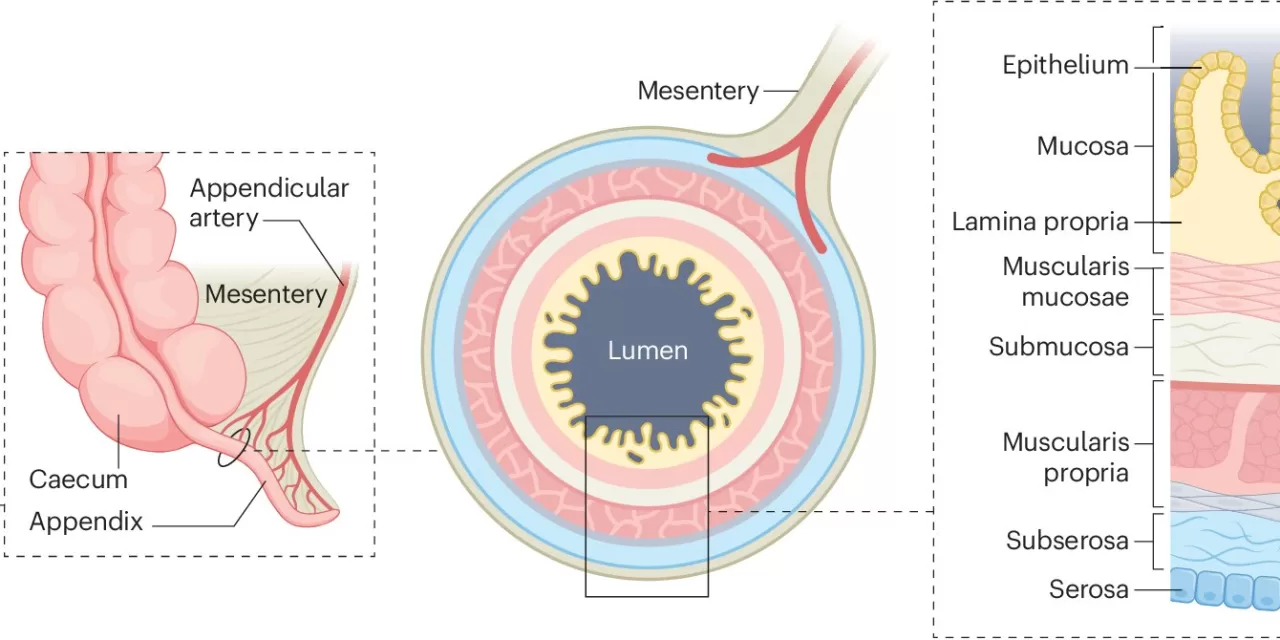Appendiceal cancer, a rare and often misdiagnosed malignancy, lacks standardized screening guidelines, well-defined risk factors, and uniform tumor classifications. These challenges frequently lead to late-stage diagnosis and poor prognosis. Up to 50% of patients are diagnosed with distant metastatic disease, with five-year survival rates ranging from 10% to 63%.
A team of leading experts has now identified six key research priority areas aimed at advancing the understanding of appendiceal tumors and improving patient outcomes. Their recommendations, published in Nature Reviews Cancer, are the result of a dedicated effort led by the Appendix Cancer Pseudomyxoma Peritonei (ACPMP) Research Foundation.
Urgent Need for Research and Collaboration
The ACPMP Research Foundation estimates that approximately 3,000 new cases of appendiceal cancer are diagnosed annually across all age groups. However, the actual incidence could be higher due to challenges in accurate diagnosis and tumor classification.
Dr. Andreana Holowatyj, assistant professor of Medicine at Vanderbilt University Medical Center and chair of the Scientific Advisory Board for ACPMP, emphasized the critical gaps in knowledge about appendiceal cancer.
“The rising burden of appendiceal cancer has illuminated the rudimentary knowledge gaps—spanning from genomes to generations—in our understanding of this rare cancer. By establishing this first-ever research ‘road map’ for appendiceal tumors, we aim to drive collaborative and transformative research discoveries that ultimately will lead to improvements in disease detection, diagnosis, treatments, and outcomes for our patients,” Dr. Holowatyj stated.
The Research Think Tank Initiative
The research priorities stem from the inaugural ACPMP Research Foundation Scientific Think Tank, held at the Vanderbilt-Ingram Cancer Center (VICC) in December 2023. The Think Tank brought together 20 leading experts in appendiceal cancer research, with a study group from this meeting authoring the recently published article.
Deborah Shelton, JD, Executive Director of ACPMP and co-author of the article, called this a pivotal moment for the field.
“For far too long, appendix cancer has remained underfunded and underresearched, leaving patients with limited options. These research priorities provide a clear path forward, and ACPMP is committed to ensuring the necessary funding and resources to propel these efforts,” Shelton stated.
Six Key Research Priorities
- Refining Histopathological Classification: Appendiceal tumors vary significantly, making consistent classification and grading essential. Efforts include digitizing histology for tumor detection and leveraging computational approaches for improved diagnosis.
- Molecular Characterization of Tumors: Since appendix tumors are often detected postappendectomy, preserving and molecularly profiling tissue samples is vital for a comprehensive understanding of these malignancies.
- Defining the Tumor Microenvironment: Examining the dynamic ecosystem surrounding tumor cells will enhance treatment strategies and contribute to a molecular atlas for appendix tumors.
- Developing Disease-Specific Models: Current appendix tumor models are scarce. Advancing patient-derived organoid models will facilitate preclinical testing of new therapies.
- Clinical Studies and Trials: Large-scale, multicenter collaborations—such as the Genetics of Appendix Cancer (GAP) Study at VICC—will help develop impactful clinical trials and evidence-based treatment approaches.
- Population-Level Research: Studying potential risk factors and exposures linked to appendiceal tumors will help establish early detection strategies, inform clinical practice, and influence public health policy.
Looking Ahead
The ACPMP Research Foundation remains committed to funding and facilitating research in these priority areas to drive meaningful advances in appendiceal cancer detection and treatment. By fostering collaboration among scientists, clinicians, and policymakers, the foundation aims to revolutionize research and clinical care for this rare cancer.
Disclaimer:
This article is for informational purposes only and does not constitute medical advice. Readers should consult healthcare professionals for diagnosis and treatment options related to appendiceal cancer or any other medical condition.












